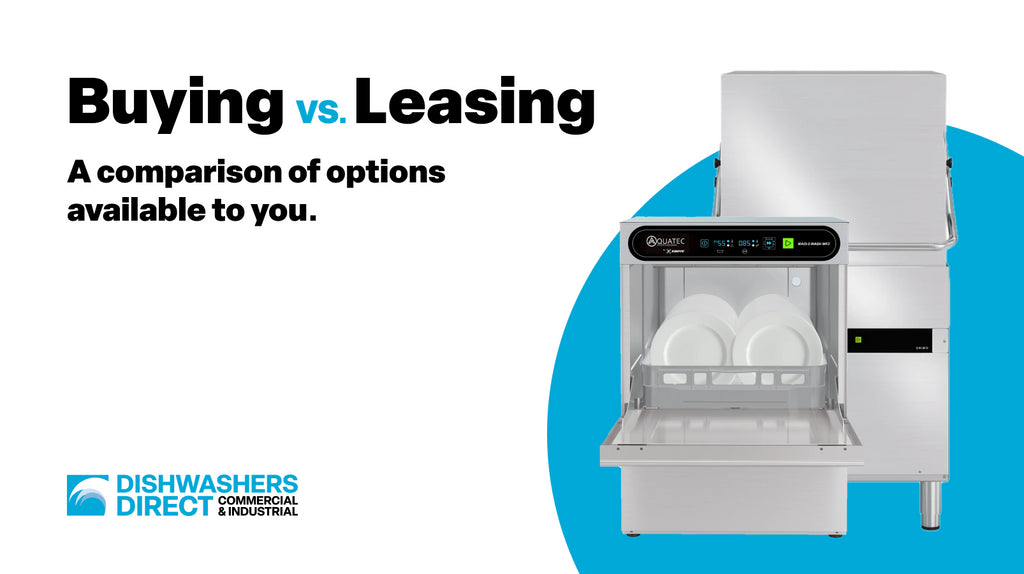Leasing vs Buying and The Options Available To You
Posted by SAMUEL DEAKIN

When shopping around for commercial equipment for your business, you’ll likely see options for buying or for leasing machines.
Whilst both options come with their own advantages, they also come with their own drawbacks. This guide is to help you make an informed decision whether buying or leasing equipment is the best solution for your business.
What You Need To Consider
1. How much money do you have?
This is probably the most important factor to consider when choosing between leasing or buying. If buying outright will put a significant dent in your business’s finances, leasing will be the better option. Ask yourself how much the loss of that initial spend is going to lead to compromises in other areas of business, especially if you’re just starting out.
2. How important is it for my business to have the latest equipment?
Leasing will allow you access to the latest equipment with the latest technology you might not be able to afford normally. However, it’s important to note that the overall cost of leasing is higher than purchasing outright. Some extra things to consider are the following: What specific functionalities of the equipment are you going to be using? What benefits will you gain from it? And in what ways is it better than what you already have?
Overall, you want to focus on how the equipment is going to help your bottom line. This might look like being able to increase your capacity to fulfil services, increasing the quality of service you provide, allowing you to add additional high-ticket services to your business offering, and streamlining and automating time-consuming processes (faster work with less cost and effort).
3. How do you want to deal with equipment maintenance?
One of the biggest differences between owning and leasing equipment is who has responsibility for the maintenance of the equipment. When you buy the equipment, the maintenance is on you to resolve any faults; when leasing equipment, the company leasing it to you will be responsible for it. Whilst having someone else deal with any equipment problems might sound tempting, each lease agreement will have its own terms regarding the promptness with which faults are fixed. If the equipment is something that your business cannot function without, ownership is likely to be better than leasing.
4. How quickly will your equipment become outdated?
Leasing equipment gives you more flexibility in updating to newer technology and replacing older pieces. If regularly upgrading your equipment is important to your business, then leasing those pieces of equipment may work out cheaper than buying.
Plan how long you will need the equipment in question for, taking into consideration the rate of innovation and wear-and-tear, and work out the costs of leasing vs buying from there.
The Pros and Cons
Leasing Pros
• Leasing can have a less severe impact on your books than buying expensive equipment outright.
• You can often get maintenance included in the lease deal, helping with inspections or repair work.
• Leasing business equipment can also be advantageous if the equipment you’re buying is up to date or new technology will soon replace it. You will often have access to newer replacement equipment as part of the deal.
• Leasing can also offer tax benefits, as the total cost can usually be deducted from taxable income.
Leasing Cons
• Although spreading the cost can help with cash flow, you may end up paying a higher total amount than if you’d purchased it outright.
• The equipment also remains the property of the supplier rather than your business unless you’re on a hire purchase contract.
Buying Pros
• Buying outright avoids being tied into a lengthy deal with a leaser, which can cause problems if your circumstances change in the future.
• Tax benefits: small businesses are able to deduct a percentage of IT investments from their taxable income.
• Leasing comes with a lot of admin, whereas buying outright avoids the paperwork. Leasing agencies are also very likely to look into your finances and carry out credit checks. If you have a low credit rating, deals will cost you more.
Buying Cons
• Depending on the retail price of the equipment you need, paying the full price upfront may be a strain. You’ll need to decide if this is something your business can budget for.
• If the equipment is likely to become outdated quickly or needs replacing, you may find yourself having to pay the same cost again in a year or a few years.
There’s no definite answer to whether leasing or buying equipment is the superior option. Each option has both advantages and drawbacks for you and your business. Leasing gives you access to top-of-the-line equipment without sacrificing lots of money and is more suitable for young companies for who the focus is growth; ownership is cheaper overall and is favourable for businesses looking to increase profit margins or wanting to sell and want a portfolio of hard assets.
Looking to upgrade your commercial equipment? Explore our buying and leasing options at Dishwasher Direct today.